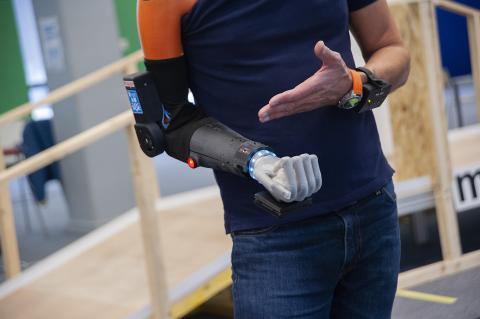
Supporting People with Disabilities
Following the Smart Arm (SAM) team's participation in Cybathlon 2020, Éric Lalanne describes the challenges of the Disability Assistance Mission that he directs. The project seeks to assist people with disabilities at every stage of their life and professional career.
One of our research teams—SAM—participates annually in Cybathlon, an international competition in which athletes with disabilities compete in events using bionic assistive technologies. Why is it important for the scientific community at Sorbonne University to be involved in this type of competition?
Éric Lalanne: From the point of view of the disability project that I manage, participation in events such as Cybathlon demonstrates the strong commitment of the Sorbonne University community to a major societal issue: that of the integration, socialization, and job retention of people with disabilities.
Students, teachers, scientists and technical staff are all equipped to think up solutions that can change the lives of those who experience difficulties from their disabilities. In this way, every member of the University community can contribute to collective social responsibility.
Are there other research teams at Sorbonne University working to develop innovative solutions for people with disabilities?
E. L.: Absolutely. Like the Smart Arm team, many laboratories and institutes at Sorbonne University are working on these issues. The Disability Assistance Mission requires different kinds of know-how from various research teams. Last year, for example, a technician from Isir, and four Polytech students supervised by their teachers, responded to one of our requests for assistance. The goal was to improve the working conditions of a colleague suffering from a chronic disability by automating the handling of a heavy rotary table.
This project created a link between the student, teacher and technical communities, but also enabled us to pass on skills, unite different teams, and stimulate collective creativity.
You lead the Disability Assistance Mission. What actions are currently being carried out by the University to improve the integration of staff with disabilities?
E. L.: The Disability Assistance Mission, created in 2016, brings together the actions of different departments involved in implementing assistive measures for those with disabilities in the workplace.
At the initiative of occupational physicians, job adjustments can be made. These include the acquisition of specific furniture, specialized software and hearing aids, as well as the use of home-to-work paratransit, adjustments to working hours, and support for professional reconversion or reclassification.
Additionally, during discussions in December 2018, the University's board of directors decided on specific measures for employees with disabilities: these can include a reduction of half an hour’s work per day (which also applies to parents of children with disabilities), vacation voucher bonuses, assistance with vacation leave (€100 per person per year). Other financial measures are linked to means testing, including assistance with additional private insurance and the financing of employment service vouchers.
Awareness-raising actions aimed at the entire University community are also organized, jointly by: the Disability Assistance Mission, the Disability Health Service for Students at the Faculties of Science and Engineering and Medicine, and the Disability Support and Tutoring Office at the Faculty of Arts & Humanities (European Disability Day, Handisport, and others).
Duoday 2020 was to take place on November 19th. What is the objective of this event, which will be held at Sorbonne University as soon as health conditions allow?
E. L.: The objective of Duoday is to bring the University's need for specific skills closer to people with disabilities looking for work. It is a great opportunity for people with disabilities to show their skills in the real conditions of the job they are applying for. For job listings published by CapEmploi, a candidate is selected and takes part in a day in situ during which a tutor will help them discover all the missions related to the position. At the end of the day, an assessment is made and if the candidate is satisfactory, a contract is offered.
In 2019, of the two positions open to this system at the University level, one contract has been signed. In 2020, eight positions are proposed in the faculties.
